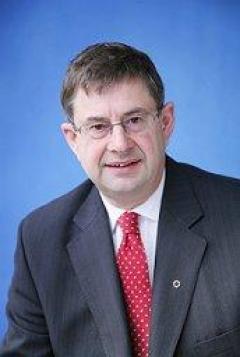ISLE OF MAN/MANNIN: O CUIV VISIT - IN THE FOOTSTEPS OF DE VALERA

The Isle of Man undoubtedly owes a great debt to Ireland because of the initiative undertaken at the behest of Éamon de Valera to ensure that a substantial spoken record of the Manx language was retained. De Valera visited the Island in 1948 and, on learning that the language was at a parlous stage, shrewdly identified the need to enable a spoken record for future generations. He ensured that recording equipment, together with an operative (Kevin Danaher of the Irish Folklore Commission), came to the Island and started work on preserving the conversation of the last native speakers. That work, once initiated, was continued by Yn Cheshaght Ghailckagh.
It is entirely fitting, therefore, that this week de Valera's grandson, Eamon O Cuiv, who is currently Ireland's Minister for Community, Rural and Gaeltacht Affairs, should be on the Isle of Man to view the legacy of his grandfathers work.
The fortunes of the Manx language since de Valera's visit have enjoyed a sea change. From being an irrelevance almost shunned by Manx people it has enjoyed a renaissance which is still growing apace. Now Manx is not only taught in schools but there are is also Manx medium education from nursery to secondary level. The fortunes of the language in the community are also more widely acknowledged and there are plans to introduce a new Manx Language Act which should safeguard the advances made.
During his visit, Eamon O Cuiv went to Cregneash village, which de Valera previously visited and heard Manx from a native speaker. Mr O Cuiv also visited the Manx Gaelic Primary School, Bunscoill Ghaelgagh, at St John's.
There are now no native speakers for O Cuiv to converse with, but there are a growing number of fluent speakers of Manx at all age levels whom he met and spoke with. These speakers have made Manx a living language again.
There is a link to the pioneering work to record the language in the 1940s here:
J B Moffatt Director of Information Celtic League 13/09/08
■